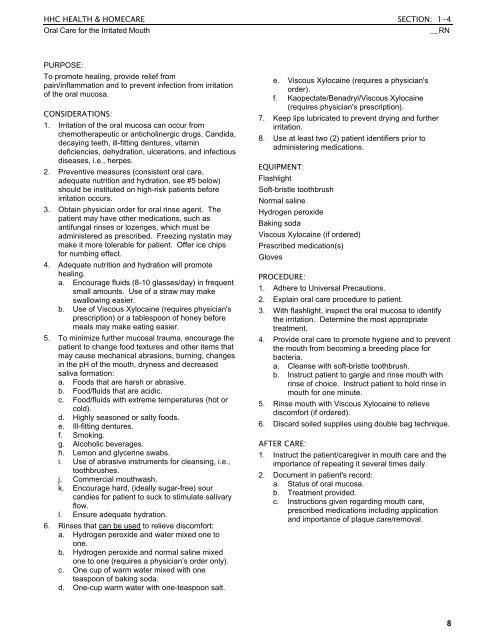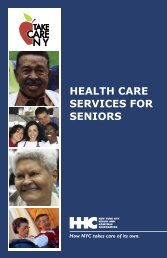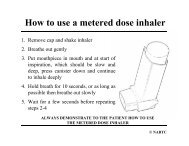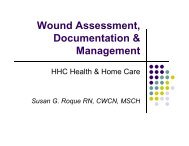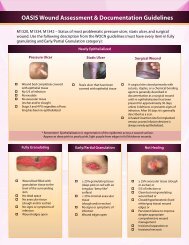HHC Health & Home Care Clinical Policy And
HHC Health & Home Care Clinical Policy And
HHC Health & Home Care Clinical Policy And
You also want an ePaper? Increase the reach of your titles
YUMPU automatically turns print PDFs into web optimized ePapers that Google loves.
<strong>HHC</strong> HEALTH & HOMECARE SECTION: 1-4<br />
Oral <strong>Care</strong> for the Irritated Mouth __RN<br />
PURPOSE:<br />
To promote healing, provide relief from<br />
pain/inflammation and to prevent infection from irritation<br />
of the oral mucosa.<br />
CONSIDERATIONS:<br />
1. Irritation of the oral mucosa can occur from<br />
chemotherapeutic or anticholinergic drugs, Candida,<br />
decaying teeth, ill-fitting dentures, vitamin<br />
deficiencies, dehydration, ulcerations, and infectious<br />
diseases, i.e., herpes.<br />
2. Preventive measures (consistent oral care,<br />
adequate nutrition and hydration, see #5 below)<br />
should be instituted on high-risk patients before<br />
irritation occurs.<br />
3. Obtain physician order for oral rinse agent. The<br />
patient may have other medications, such as<br />
antifungal rinses or lozenges, which must be<br />
administered as prescribed. Freezing nystatin may<br />
make it more tolerable for patient. Offer ice chips<br />
for numbing effect.<br />
4. Adequate nutrition and hydration will promote<br />
healing.<br />
a. Encourage fluids (8-10 glasses/day) in frequent<br />
small amounts. Use of a straw may make<br />
swallowing easier.<br />
b. Use of Viscous Xylocaine (requires physician's<br />
prescription) or a tablespoon of honey before<br />
meals may make eating easier.<br />
5. To minimize further mucosal trauma, encourage the<br />
patient to change food textures and other items that<br />
may cause mechanical abrasions, burning, changes<br />
in the pH of the mouth, dryness and decreased<br />
saliva formation:<br />
a. Foods that are harsh or abrasive.<br />
b. Food/fluids that are acidic.<br />
c. Food/fluids with extreme temperatures (hot or<br />
cold).<br />
d. Highly seasoned or salty foods.<br />
e. Ill-fitting dentures.<br />
f. Smoking.<br />
g. Alcoholic beverages.<br />
e. Viscous Xylocaine (requires a physician's<br />
order).<br />
f. Kaopectate/Benadryl/Viscous Xylocaine<br />
(requires physician's prescription).<br />
7. Keep lips lubricated to prevent drying and further<br />
irritation.<br />
8. Use at least two (2) patient identifiers prior to<br />
administering medications.<br />
EQUIPMENT:<br />
Flashlight<br />
Soft-bristle toothbrush<br />
Normal saline<br />
Hydrogen peroxide<br />
Baking soda<br />
Viscous Xylocaine (if ordered)<br />
Prescribed medication(s)<br />
Gloves<br />
PROCEDURE:<br />
1. Adhere to Universal Precautions.<br />
2. Explain oral care procedure to patient.<br />
3. With flashlight, inspect the oral mucosa to identify<br />
the irritation. Determine the most appropriate<br />
treatment.<br />
4. Provide oral care to promote hygiene and to prevent<br />
the mouth from becoming a breeding place for<br />
bacteria.<br />
a. Cleanse with soft-bristle toothbrush.<br />
b. Instruct patient to gargle and rinse mouth with<br />
rinse of choice. Instruct patient to hold rinse in<br />
mouth for one minute.<br />
5. Rinse mouth with Viscous Xylocaine to relieve<br />
discomfort (if ordered).<br />
6. Discard soiled supplies using double bag technique.<br />
AFTER CARE:<br />
6.<br />
h. Lemon and glycerine swabs.<br />
i. Use of abrasive instruments for cleansing, i.e.,<br />
toothbrushes.<br />
j. Commercial mouthwash.<br />
k. Encourage hard, (ideally sugar-free) sour<br />
candies for patient to suck to stimulate salivary<br />
flow.<br />
l. Ensure adequate hydration.<br />
Rinses that can be used to relieve discomfort:<br />
1.<br />
2.<br />
Instruct the patient/caregiver in mouth care and the<br />
importance of repeating it several times daily.<br />
Document in patient's record:<br />
a. Status of oral mucosa.<br />
b. Treatment provided.<br />
c. Instructions given regarding mouth care,<br />
prescribed medications including application<br />
and importance of plaque care/removal.<br />
a. Hydrogen peroxide and water mixed one to<br />
one.<br />
b. Hydrogen peroxide and normal saline mixed<br />
one to one (requires a physician’s order only).<br />
c. One cup of warm water mixed with one<br />
teaspoon of baking soda.<br />
d. One-cup warm water with one-teaspoon salt.<br />
8


